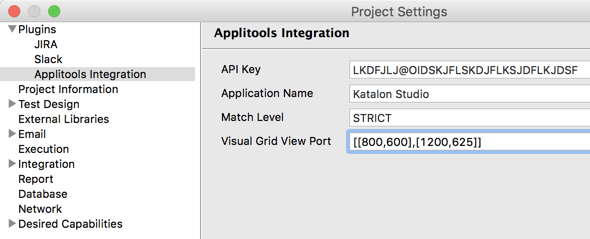Katalon Studio and Applitools: When Codeless Meets AI

It is apparent that the world of high-tech products is moving faster. Production code is getting pushed more frequently, and products are growing faster than ever before, making quality at speed one a top priority. Now more than ever, teams need a solution that effectively shortens the testing cycle, yet ensures quality for the application under test.
Testing is an essential part of software development process. However, the approach to testing effectively is still disputed within the testing community: whether or not extensive coding skills are required to apply automated testing.
Katalon Studio, the leading codeless testing tool, is an ideal solution for teams without a comprehensive programming background. The tool allows for a simplified getting started process and robust testing capabilities to assure product performance.
It provides an all-in-one solution for all testing needs with an out-of-the-box framework for teams to accelerate quickly with automation and scale up easily as they grow. Applitools Visual AI platform combined with Katalon Studio’s codeless methodologies offer a seamless and integrated end-to-end testing solution for users.
The challenges of testing in the codeless era

As explained above, to successfully transition from manual testing to automated testing, teams might face a few challenges. Such change can affect their process of testing, the collaboration between team members, and project management.
Some major challenges for adopting automation can be listed as:
- Programming skills: For most automation platforms, the QA team must possess sufficient coding skills to write, execute, and maintain test scripts. For manual testers who just started the transition to automation testing from scratch, coding knowledge appears to be the most significant obstacle.
- Test flakiness: Most experienced testers agree that flakiness is a constant pain point in automation testing. Flaky tests occur due to many factors, including poorly written scripts, concurrency, async wait, test order dependency, etc. There is no absolute solution for flaky tests at the moment.
- Scalability: Functional automation testing is challenging at scale. As the method solely follows pre-written scripts, the QA team must have a clear and well-designed plan to successfully scale up the whole process. Apart from designing the test carefully, the team needs automated tools that are powerful enough for integration.
- Visual testing: Ensuring visual quality is vital since visual defects often impact functionality as well as the overall user experience. While some teams continue to manually test for visual defects, more and more modern teams have shifted to visual test automation and relying on advanced AI features to save time and money and ensure visual perfection.
Agile teams today need a solution that helps them accelerate testing without too much of a learning curve. Thus the emergence of codeless tools like Katalon Studio to help new automation testers quickly get used to the practices and drive valuable results for their team.
All the obstacles above can be easily overcome with the right tools and approaches. The combination of Applitools Visual AI Platform and Katalon Studio’s low code approach makes it simple for testers to automate test processes with minimal risk and guaranteed ROI for testing.
Going codeless using Katalon Studio and Applitools as the solution

In terms of skill demand and time limitation, codeless automation is the desirable solution for QA teams at all levels to best utilize automated testing. Codeless automated tools speed up the entire testing project significantly by cutting down the amount of time and effort spent on coding.
Katalon Studio is a test automation tool made for teams at any stage of testing with diverse application needs. The tool offers a wide range of integration capabilities and scales up options for teams to optimize their testing — all in a single downloadable package.
Feature-wise, Katalon Studio is a comprehensive tool with built-in capabilities for testing on all platforms and environments. It also provides native integrations with CI/CD tools, cloud executions, and test artifacts management tools.
Moreover, users can also leverage Artificial Intelligence (AI) for visual testing with the integration with Applitools. This allows for more simplified UI testing with higher accuracy and proven testing performance. Besides applying AI, there are also more exciting innovations offered by codeless testing tools to solve the challenges above.
How to Configure the Applitools Integration Plugin in Katalon Studio
Go to Project/Settings/Plugins/Applitools Integration for configurations:

Where
- API Key: Required field. For quick testing, you only need to enter the API Key and leave out the rest.
- Application Name: Name of the application in Applitools. You don’t have to create an application in Applitools beforehand.
- Match Level: Match level in Applitools.
- Visual Grid View Port: list of viewports including width and height for Applitools Visual Grid. Once you have specified all browser images under, those viewports will be captured and compared.
- [[width1, height1], [width2, height2], …] (e.g., [[800,600],[1200,630]])
- leave empty: use the browser viewport at the point of execution
Visual Grid View Port configuration is applicable for both checkWindow and checkElement keywords.
It is possible to use the Applitools Integration plugin for both Recording and Scripting Modes in Katalon Studio. Please refer to Katalon Documentation to get an in-depth tutorial for this plugin.
You can get the Katalon Studio automation tool from www.katalon.com — create a free account, hit download, and you’re done!
About the Author
Dzung Ngo is Vice President of Product at Katalon with more than 10 years of experience in software engineering, especially software testing. Have a question for Dzung? You can reach him out via info@katalon.co







